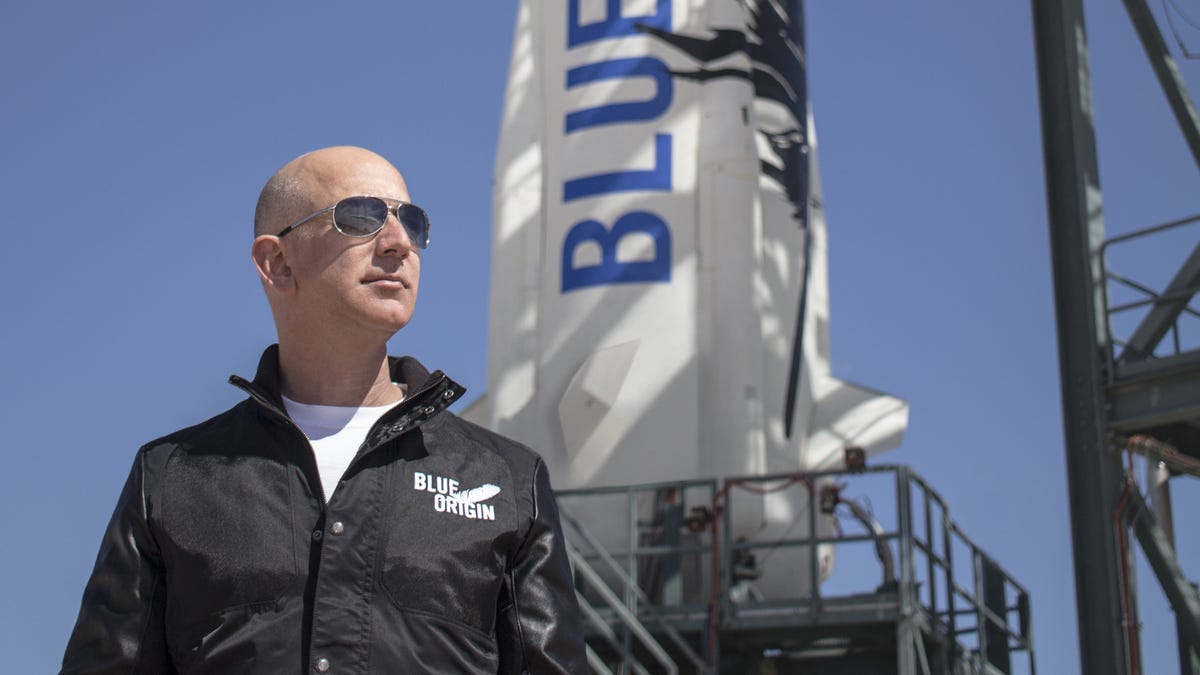Jeff Bezos and NASA really want to get to the moon, perhaps together
In recent days the world's richest person and its biggest space agency have amped up talk of putting more footprints on our only natural satellite.

Bezos is laser-focused on the moon.
Elon Musk likes to talk about moving us to Mars, but some of the other big players in the new space race are more interested in getting back to our beloved natural satellite.
Over the weekend, Amazon and Blue Origin founder Jeff Bezos laid out his plan to setup a moon base, just a few days after NASA said it's in the market to buy a ride back to the moon itself.
We already know that Bezos has been in touch with NASA about setting up shop on the moon, and he told Geekwire's Alan Boyle on stage at the International Space Development Conference on Friday that Blue Origin will build a "Blue Moon" lunar lander regardless of whether NASA signs up as a partner on the project.
"By the way, we will do that, even if NASA doesn't do it," Bezos said. "We'll do it eventually. We could do it a lot faster through a partnership."
Over the past several weeks, NASA has given some mixed signals on its moon plans. The agency canceled its lunar lander and drilling rig named "Resource Prospector," then put out a request for proposals asking commercial companies to help it send some of the same payloads to the moon that would have been on the in-house lander.
On Thursday, NASA put out a statement re-iterating that the drill and instruments from Resource Prospector meant to extract and identify water, hydrogen and other volatiles on the lunar surface will be sent to the moon on commercial launches instead.
"These tools will provide important scientific data on various landing sites, and will help NASA better understand the lunar environment," said Dennis Andrucyk, deputy associate administrator for NASA's Science Mission Directorate.
In their statements in recent days, Bezos and NASA administrator Jim Bridenstine both cited the same reasons for establishing a presence on the moon.
"We know there are volatiles at the poles on the moon, and quite frankly, that water ice could represent rocket fuel," Bridenstine said. "If we have the capability to generate rocket fuel from the surface of the moon, and get them into orbit around the moon, we could use that to build a fueling depot. If we want to make that happen though, we will need commercial partners."
Bezos noted that the ice could also be converted to drinking water and air for breathing.
"It's almost like somebody set this up for us," he told Boyle.
While NASA and Blue Origin seem to be aligned in their drive to get to the moon, it is of course too soon to say if the two will actually collaborate on such a mission. Blue Origin's lander design is still years from being a reality, and the company has yet to fly a rocket designed to take a payload beyond just the edge of space. It has so far been focused on sending tourists on suborbital flights aboard its New Shepard rocket.
NASA would like to sign up with a commercial launch provider for a robotic mission to drop off supplies on the lunar surface as soon as next year, a significant acceleration of previous timelines to return to the moon.
Blue Origin isn't likely to be able to send NASA's gear anywhere next year; Musk's SpaceX is more likely to be able to pull that mission off, or another NASA provider like United Launch Alliance or Orbital ATK.
But Bezos isn't too focused on being the first to go back to the moon. He says he's more interested in the long game and relocating much of humanity's heavy industrial activity off the planet in the decades to come.
"The Earth is not a very good place to do heavy industry," Bezos said. "It'll start to be easier to do a lot of the things that we currently do on Earth in space... and it's going to make this planet better. We'll come and go, and the people who want to stay will stay."
Bezos says he doesn't want the moon to be a Blue Origin project, unless it has to be.
"I hope we don't need to do any of it. I want other people to do it. But if need be, we'll do it."
Crowd Control: A crowdsourced science fiction novel written by CNET readers.
Solving for XX: The tech industry seeks to overcome outdated ideas about "women in tech."

